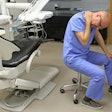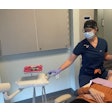Not quite half of dentists appear to have been grappling with depression and anxiety since before the COVID-19 pandemic, according to a new systematic review published recently in Health Science Reports.
The prevalence rates of depression and anxiety symptoms among dentists were 42% and 44%, respectively. Approximately 1 in 10 dentists reported severe anxiety and depression, the authors wrote.
“A significant percentage of moderate to severe depression and anxiety can negatively affect the mental health status of dentists and the amount and quality of dental services they provide,” wrote the authors, led by Tina Peraica of the University of Split in Croatia (Health Sci Rep, May 5, 2025, Vol. 8:5, e70786).
Depression and anxiety symptoms may be considerable indicators of work-related psychological distress in dentists. These symptoms and distress may lead to burnout, mistakes, and poorer patient outcomes. Awareness can help lead to direct, appropriate prevention and treatment interventions.
To explore the prevalence and severity of depression and anxiety symptoms among dentists before and during the pandemic, 33 articles were analyzed, according to the review.
Among dentists, the prevalence rates of depression and anxiety symptoms were 42% and 44%, respectively, the authors wrote. For mild, moderate, and severe or extremely severe depression, the prevalence rates were 20%, 18%, and 8%, respectively. Similarly, the prevalence rates for mild, moderate, and severe or extremely severe anxiety were 21%, 18%, and 11%, respectively, they wrote.
Furthermore, the studies showed no evidence that depression or anxiety prevalence rates between the periods before and during COVID-19 were different, according to the review.
Nevertheless, the review had limitations, including that the studies included may not completely represent dentists. This limits the generalizability of the results, the authors wrote.
Since this review confirmed the high levels of depression and anxiety among dentists before and during the COVID-19 pandemic, a longer-term strategy that supports the mental and physical well-being of dental professionals should be implemented in the future, they wrote.
“Future interventions should take a holistic approach aimed at creating a healthy, safe, and supportive work environment, including organizational support from regulatory bodies and government along with continuous mental health monitoring,” Peraica and colleagues wrote.




















